COVID-19 Community Resources
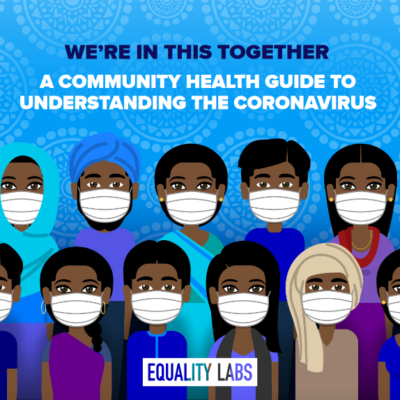 Access this guide in additional languages.
Access this guide in additional languages.
Advance Care Planning During COVID-19
As we practice social distancing to prevent the spread of coronavirus, staying connected and having conversations with loved ones about what matters most is of equal importance. Take some time to share your hopes and fears for the future with those closest to you. Review your advance directive if you have one to make sure it represents your preferences and priorities. If you’ve never completed an advance directive, now is the perfect time to:
- Name the individual(s) who know you best and could speak on your behalf if you become ill and cannot speak for yourself.
- Share details about your goals and values so that your family, friends and the health care team can provide the best care possible for you.
- Give copies of your document to your loved ones, doctor, hospital, and the Vermont Advance Directive Registry.
Frequently Asked Questions
The following individuals and organizations (sorted by county) are available to provide advance care planning support remotely by email, phone, or video call:
| County | Organization | Name | Title | Phone | Additional Considerations | |
|---|---|---|---|---|---|---|
| Addison County | End of Life Services | Laurie Borden | Program Director | (802) 388-4111 | Phones are staffed from 12pm-2pm, M-F, for questions, information requests, or to schedule a Zoom appointment for one-on-one support. | |
| Chittenden County | BAYADA | Nick Parrish | Psychosocial Manager | (802) 448-1610 | ||
| Chittenden County | UVMMC Office of Community Health Improvement | Community Health Team | (802) 847-1601 | Support is available for patients of Chittenden County UVM Health Network providers. Please call the number listed to verify whether your provider is part of the network. | ||
| Chittenden County | UVM Health Network Home Health & Hospice | Holly Thompson | Volunteer Coordinator, Who's Your Person... What's Your Plan? | (802) 734-5531 | Email is the preferred mode of contact. | |
| Orleans County | North Country Hospital | Neely Bryant, MSW | Inpatient Case Management Department | (802) 334-3261 | ||
| Washington County | Central Vermont Home Health & Hospice | Jim Budis, RN | Hospice & Palliative Care Manager | (802) 224-2240 | ||
| Washington County | Central Vermont Medical Center | Elaine Hafter, MSW | Care Coordinator, Palliative and Spiritual Care Department | (802) 371-5375 | Voicemail will be checked between 8am-4:30pm, M-F. Also available by pager at (802) 452-7949 during this timeframe. | |
| Windham County | Brattleboro Area Hospice | Don Freeman | Taking Steps Brattleboro Advance Care Planning Program Coordinator | (802) 257-0775, ext 101 |
Having difficulty viewing this table? Click here.
At this time of increased social isolation, we understand that it may be challenging for some to identify an appropriate individual to serve as their health care agent, especially in the absence of close family and friends. While someone may not come to mind immediately, keep in mind that your agent doesn’t have to be a family member. According to Vermont law, anyone 18 years of age or older can serve as your agent, with the following exceptions:
“The principal’s health care provider may not be the principal’s agent. Unless related to the principal by blood, marriage, civil union, or adoption, an agent may not be an owner, operator, employee, agent, or contractor of a residential care facility, a health care facility, or a correctional facility in which the principal resides at the time of execution of an advance directive.”
This leaves ample room for a creative approach. We encourage you to think outside the box for someone trustworthy that you could communicate your wishes to and who is willing and able to communicate your wishes to the health care team in the event that you are unable to speak for yourself. It could be a friend, more distant relative, neighbor, or someone from your place of worship.
Even if you may not have someone you wish to name as your health care agent, it is still important to share what is important to you in terms of any future health care needs. If your doctor or the medical team can’t speak to you directly, they will still want to know about your health care priorities and preferences. Use the short form advance directive, draw a line through the section(s) in Part 1 for appointing a health care agent so it is clear that you did not forget to fill this out but have intentionally left it blank, and complete sections 2 – 5 of the form. You can also attach any additional information that you want health care providers to know. Just be sure that you write your name, date of birth, and the date you are completing the document at the top of any additional pages so it is clear that these pages are to be included with the entire signed and witnessed document. It’s also a good idea to make note on the form itself to “see attached pages” to direct the reader of the document to look for them.
When the COVID social distancing recommendations and requirements began, VEN received many inquiries about how to safely engage in advance care planning and complete advance directive documents without being in the physical presence of witnesses and/or explainers. At that time, we recommended (and provided information on our website) that people utilize telephone and virtual forms of communication to have conversations and document “virtual” witnessing and explaining. Keeping in mind that while this did not meet existing legal requirements for properly executed advance directives, such documents carried moral weight and would still be considered when making medical decisions for a patient who lacked capacity. We also recommended that people be prepared to complete a replacement document with in-person witnessing as soon as it was safe to do so.
Since providing this initial guidance, we shared that a bill (H.950) addressing remote witnessing and explaining of advance directives was making its way through the legislative process. We are happy to report that H.950 passed and was signed by Governor Scott on June 15, 2020 as Act Number 107. This Act addresses the legal status of advance directives completed using remote witnesses and/or explainers during two time-frames:
- Documents completed between February 15, 2020 and June 15, 2020 (the period 30 days prior to the declared COVID state of emergency until the effective date of H.950)
- Documents completed between June 15, 2020 and June 30, 2021 (the period after the effective date of H.950)
In the case of documents completed using remote witnesses between February 15 and June 15 of 2020—these documents are considered valid if: the remote witnesses were known to the principal (a principal is the person completing their advance directive), the remote witnesses were informed about their role in witnessing the advance directive, and the principal included the name and contact information of the remote witnesses. Documents completed during this time frame will be considered valid ONLY UNTIL June 30, 2021 unless amended, revoked or suspended by the principal prior to that date.
In the case of documents completed using remote witnesses between June 15, 2020 and June 30, 2021—these documents are considered valid if: the remote witnesses were known to the principal, the witnesses attested that the principal seemed to understand the nature of the document and was free from duress or undue influence at the time the advance directive was signed, and the principal included the name, contact information and relationship of the witnesses to the principal. Documents completed during this time shall remain valid unless amended, revoked or suspended by the principal.
Detailed instructions on how to complete an advance directive using remote witnessing are as follows:
- Talk to your family and friends about what matters most to you and ask someone you trust to be your health care agent.
- Choose the form that works best for you and write down your health care goals and priorities.
- Identify 2 adults willing to serve as remote witnesses. Please note that witnesses cannot be your agent, spouse, parents, siblings, adult children or grandchildren. For remote witnessing, they must be someone you know. Your health care provider may serve as a witness.
- Have your witnesses be on the phone or a video chat and tell them “by being my remote witness you are attesting to the fact that I, the principal, seemed to understand the nature and effect of the advance directive and was free from duress or undue influence at the time of signing”.
- Sign and date your document.
- Write each remote witness’ name, phone number, relationship to you (i.e. friend, neighbor, work colleague, etc.), and the date on the document.
- In the witness signature line, write “verbal witness per COVID-19” if witnessed via telephone discussion, or write “video witness per COVID-19” if witnessed via video conferencing.
If you created a document using remote witnesses between February 15, 2020 and June 15, 2020, you need to complete a replacement advance directive either with in-person witnesses (if it is safe to do so) or following the steps outlined above.
We recommend that you give copies of your document to your loved ones, doctor, hospital where you are most likely to receive care, and the Vermont Advance Directive Registry. Instructions for how to register your document with the Registry are available here. We have also been in recent communication with a number of hospitals in the state to obtain mailing instructions for completed advance directives. This information is available below and will be updated as additional listings are received:
Sending Completed Advance Directives to Your Local Hospital
| Hospital Name | Department | Mailing Address | Attention: | Fax (if applicable) | Email (if applicable) |
|---|---|---|---|---|---|
| Brattleboro Memorial Hospital | Health Information Department | 17 Belmont Ave, Brattleboro, VT 05301 | Jon O'Brien | ||
| Central Vermont Medical Center | Medical Records | PO Box 547, Barre, VT 05641 | (802) 371-5351 | ||
| Mt. Ascutney Hospital and Health Center | Health Information | 289 County Rd, Windsor, VT 05089 | (802) 674-7152 | or | |
| North Country Hospital | Health Information Management (HIM) | 189 Prouty Drive, Newport, VT 05855 | |||
| The University of Vermont Medical Center | Medical Records | 111 Colchester Ave, Burlington, VT 05401 | (802) 847-5531 |
COVID Advance Care Planning Tools & Resources
Being Prepared in the Time of COVID-19
A guide with three important things each of us can do, right now, to be prepared.
VisitProactive Care Planning for COVID-19: a Guide for High Risk Adults (Respecting Choices)
A guide to aid high risk adults in planning for future healthcare choices and identifying treatment preferences before a medical crisis.
VisitRole of the Health Care Agent for COVID-19 (Respecting Choices)
A guide to the responsibilities of a health care agent, including determining what your loved one would want if they became ill with the COVID infection.
VisitCOVID-19 Shared Decision-Making Tool (NHPCO)
A tool for proactive informed decision-making to ensure seriously ill individuals can make their wishes known and access care concordant with their preferences as available.
VisitMaking a Medical Plan During COVID-19 (PREPARE For Your Care)
Tip sheet to assist in planning ahead in the event you become ill and to make your care wishes known.
VisitEnd-Of-Life Wishes In A Pandemic (VPR)
An episode of VPR's "Brave Little State" exploring how advance directives are affecting treatment and outcomes for COVID-19 patients in Vermont.
VisitGeneral Information
Centers for Disease Control and Prevention (CDC): 2019 Novel Coronavirus
Information from the CDC, including how to protect yourself, symptoms, guidance for travel, and more.
VisitWorld Health Organization (WHO): 2019 Novel Coronavirus
Information from the WHO on what the virus is, how to protect yourself, # of global cases, travel advice, and more.
VisitMasks Are Not Created Equal (The Hastings Center)
An article explaining the effectiveness of various types of masks and offering related considerations.
Read ArticleCOVID-19 Resources for Older Adults, Family Caregivers and Health Care Providers (John A. Hartford Foundation)
A collection of resources and information on what older adults and their caregivers should know.
VisitCOVID-19: Medical Communication Access for Deaf and Hard of Hearing (National Association of the Deaf)
A guide to help deaf and hard of hearing patients prepare for a hospital visit during the COVID-19 pandemic.
VisitPlain Language Information on Coronavirus (Green Mountain Self-Advocates)
COVID-19 information by and for people with intellectual and developmental disabilities.
VisitPlain Language Tips for Working with Support Staff During COVID-19 (Green Mountain Self-Advocates)
Tips to help people with intellectual and developmental disabilities deal with the changes associated with Coronavirus.
VisitCoronavirus Mutation Panic (The Hastings Center)
An article offering insight on the new variant of the coronavirus circulating in England and key considerations that have been left out of the headlines.
Read ArticleResponding to COVID-19: A Science-Based Approach (American Public Health Association & National Academy of Medicine)
A webinar series exploring the scientific basis for guidance issued by government, health and public health organizations, as well as answers to commonly asked questions.
VisitEmpowering and Protecting Your Family During the COVID-19 Pandemic
Dr. David Price of Weill Cornell Medical Center in New York City shares information on empowering and protecting families during the COVID-19 pandemic.
VisitRitual and Grief in the Time of COVID-19 - Part 1 (The Conversation Project)
The first of a two-part blog series that discusses the issue of preserving rituals and honoring grief in the unprecedented time of COVID-19.
VisitRitual and Grief in the Time of COVID-19 - Part 2 (The Conversation Project)
The second of a two-part blog series that discusses the issue of preserving rituals and honoring grief in the unprecedented time of COVID-19.
VisitVermont Resources
Vermont Department of Health: 2019 Novel Coronavirus
Information for Vermonters, including what to do if you have symptoms, when to call, testing activity in VT, and more.
VisitThe University of Vermont Health Network: Coronavirus
Information from the UVM Health Network on what to do if you feel sick, how to protect yourself, visitor restrictions, cases at UVMHN facilities, and more.
VisitVermont Association of Hospitals & Health Systems: Coronavirus Facts
Answers to common Coronavirus questions for Vermonters.
VisitThe Story Listening Project (Vermont Conversation Lab)
A study designed to collect stories from family members, friends, and clinicians of those who died in a hospital, nursing home or other healthcare facility in Vermont or the Adirondack region of New York during the COVID-19 pandemic.
Learn More & ParticipateNovel Therapeutics
FDA Fact Sheet on Emergency Use Authorization (EUA) for COVID-19 Convalescent Plasma Use
Information to help patients and their caregivers understand the risks and benefits of taking COVID-19 convalescent plasma.
DownloadHealth Equity
The COVID-19 Pandemic Shows Why We Must—And How We Can—End Racial Injustice in Health (TIME)
An article detailing how we can turn shared anger into action through four concrete actions.
VisitQuestions of Bias in Covid-19 Treatment Add to the Mourning for Black Families (The New York Times)
An article detailing how for many black families, mourning coronavirus deaths brings an added burden as they wonder whether racial bias may have played a role.
VisitHospice and Palliative Care Services During COVID-19
Hospice and palliative care agencies across the state are continuing to offer services during the COVID-19 pandemic. Below are overviews by agency of the services each are delivering (we will continue to add more as they become available):
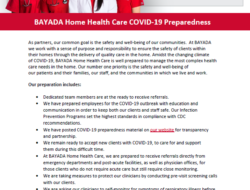 BAYADA
BAYADA
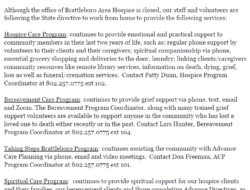 Brattleboro Area Hospice
Overview of Services During COVID-19
Brattleboro Area Hospice
Overview of Services During COVID-19
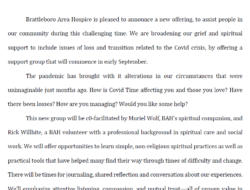 Brattleboro Area Hospice
COVID Support Group Offering
Brattleboro Area Hospice
COVID Support Group Offering
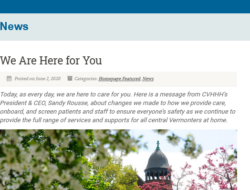 Central Vermont Home Health & Hospice
Central Vermont Home Health & Hospice
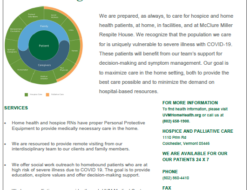 UVM Health Network Home Health & Hospice
UVM Health Network Home Health & Hospice
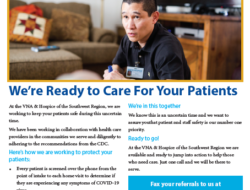 VNA & Hospice of the Southwest Region
VNA & Hospice of the Southwest Region